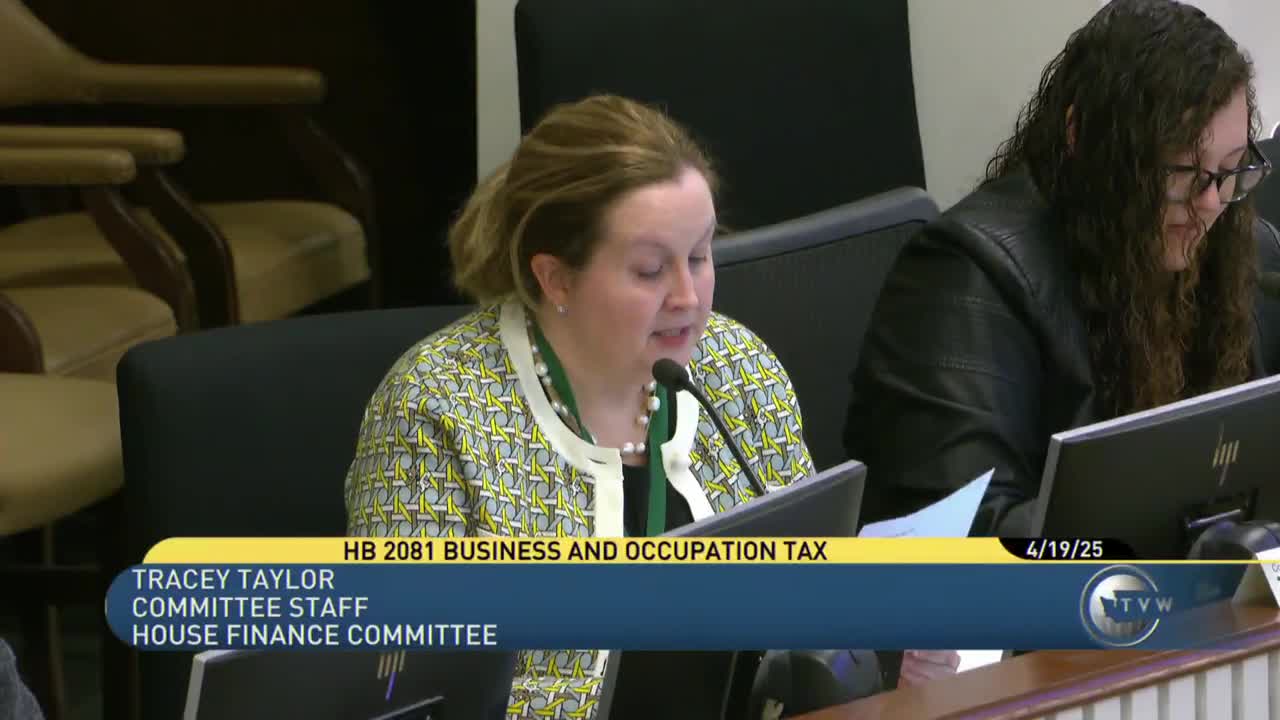Finance Committee advances broad B&O tax package with amendments; committee votes 9-6 to report bill
Get AI-powered insights, summaries, and transcripts
Subscribe
Summary
The Washington House Finance Committee voted 9-6 to report substitute House Bill 2,081, a multi-part package of changes to Business & Occupation (B&O) tax rates and surcharges, after adopting several amendments affecting thresholds, exemptions and surcharge caps.
The House Finance Committee on Saturday advanced a substitute version of House Bill 2,081, a sweeping package of changes to Washington’s Business & Occupation (B&O) tax code, by a 9-6 vote. Committee members adopted multiple amendments before voting to report the bill to the next stage with a "due pass" recommendation.
The bill as briefed by Tracy Taylor, staff to the committee, would raise B&O tax rates and add new surcharges for specified categories of businesses. Key elements described by staff include increasing the B&O rate to 0.5% for manufacturing, retail and wholesaling activities effective Jan. 1, 2027; raising B&O rates for services and other activities for businesses with gross receipts over $1,000,000 beginning Oct. 1, 2025; a 0.5% surcharge on taxpayers with Washington taxable income over $250,000,000 from Jan. 1, 2026, through Dec. 30, 2030; an increase in the financial-institutions B&O surcharge from 1.2% to 1.5% beginning Oct. 1, 2025; and raising the advanced computing surcharge and its annual cap. The proposed substitute and many of the specific amendments were identified by bill/amendment numbers during the briefing.
Committee debate focused on mitigating effects for small businesses, clarifying affiliate and activity definitions, indexing thresholds to inflation and narrow exemptions for particular business lines. Representative Parsley’s amendment moved a services-rate threshold from $1 million to $5 million to protect smaller firms; that amendment was adopted. The committee approved amendments clarifying affiliate-processing exclusions, expanding the B&O deduction for investment vehicles, exempting certain wholesaling activities, and adjusting the advanced computing surcharge cap and application. Several other amendment proposals were withdrawn or not adopted after discussion about fiscal analysis and administrative complexity.
Several members urged caution about burdening small employers and health-care providers; others framed the package as necessary to fund public services. Representative Street, speaking as mover, said the bill addresses structural issues in the tax code and funds public safety, education and health care. Representative Abel and others voiced opposition, citing concerns about impacts on small independent providers and the effect of surcharges on major employers.
On the committee roll call, the following positions were recorded: Representative Berg (aye); Representative Street (aye); Representative Orcut (nay, do not pass); Representative Jacobson (nay, do not pass); Representative Abel (nay, do not pass); Representative Chase (nay, do not pass); Representative Mena (aye); Representative Partially (aye); Representative Penner (nay, do not pass); Representative Rammell (aye); Representative Santos (aye); Representative Scott (aye); Representative Springer (aye); Representative Wallin (nay, do not pass); Representative Wiley (aye). Staff announced the final tally as 9 ayes, 6 nays, 0 excused.
The committee’s action will send the amended substitute to the next step in the legislative process with a recommendation to pass. The committee did not adopt every proposed amendment; several sponsors said they would pursue refined language or additional fiscal analysis on the floor. The bill text and adopted amendments specify phased-in effective dates and caps; implementation and administrative details will be handled by the Department of Revenue if the bill becomes law.
